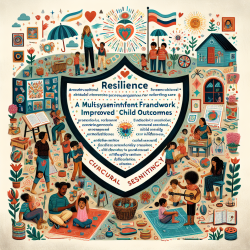Introduction
In today's interconnected world, the demand for well-prepared humanitarian workers is more pressing than ever. The research article "Residents working with Médecins Sans Frontières: training and pilot evaluation" sheds light on a training program designed to equip medical residents for their first field deployment with Médecins Sans Frontières (MSF). This blog explores how practitioners, including those in online therapy services like TinyEYE, can enhance their skills by integrating the outcomes of this research or conducting further studies.
Key Insights from the Research
The training program, developed by the Research Center in Emergency and Disaster Medicine (CRIMEDIM) in collaboration with MSF-Italy, focuses on a blended-learning approach. This includes a 3-month distance learning module, a 1-week instructor-led coaching session, and a field placement with MSF. The program covers essential topics such as disaster medicine, public health, safety, security, and communication.
The effectiveness of this training was evaluated using Kirkpatrick’s training evaluation model, which measures reaction, learning, and behavior. The results showed a significant improvement in post-test scores and overall performance, indicating that the training effectively enhanced the residents' skills and knowledge.
Implications for Practitioners
Practitioners in various fields, including online therapy, can draw valuable lessons from this research. Here are some ways to implement these insights:
- Adopt Blended Learning Approaches: Incorporate a mix of online and in-person training sessions to enhance learning outcomes. This approach can be tailored to suit different learning styles and provide flexibility.
- Focus on Core Competencies: Develop training programs that go beyond job-specific skills to include core competencies such as communication, leadership, and cultural sensitivity.
- Utilize Simulation-Based Training: Use simulation exercises to mimic real-world scenarios, allowing practitioners to practice and refine their skills in a controlled environment.
- Conduct Regular Evaluations: Implement regular assessments to measure the effectiveness of training programs and make necessary adjustments to improve learning outcomes.
Encouraging Further Research
While the research provides a solid foundation, there is always room for further exploration. Practitioners are encouraged to conduct additional studies to explore the long-term impact of training programs on professional development and patient outcomes. Collaborating with academic institutions and humanitarian organizations can also provide valuable insights and resources.
Conclusion
The research on training programs for medical residents working with MSF offers valuable insights that can be applied across various fields, including online therapy services. By adopting blended learning approaches, focusing on core competencies, and conducting regular evaluations, practitioners can enhance their skills and improve their service delivery.
To read the original research paper, please follow this link: Residents working with Médecins Sans Frontières: training and pilot evaluation.










